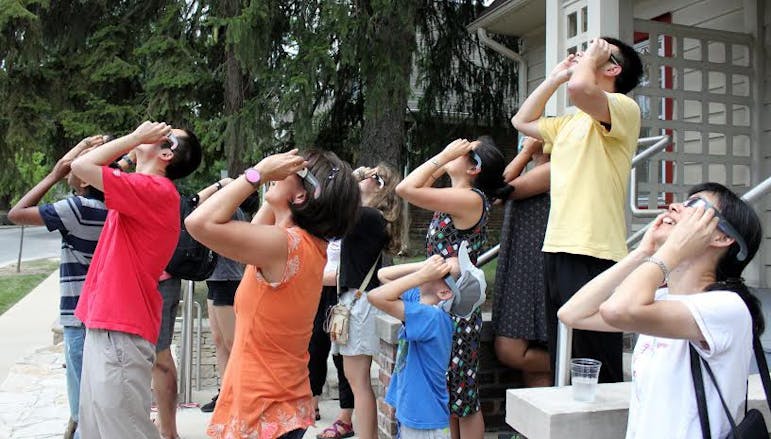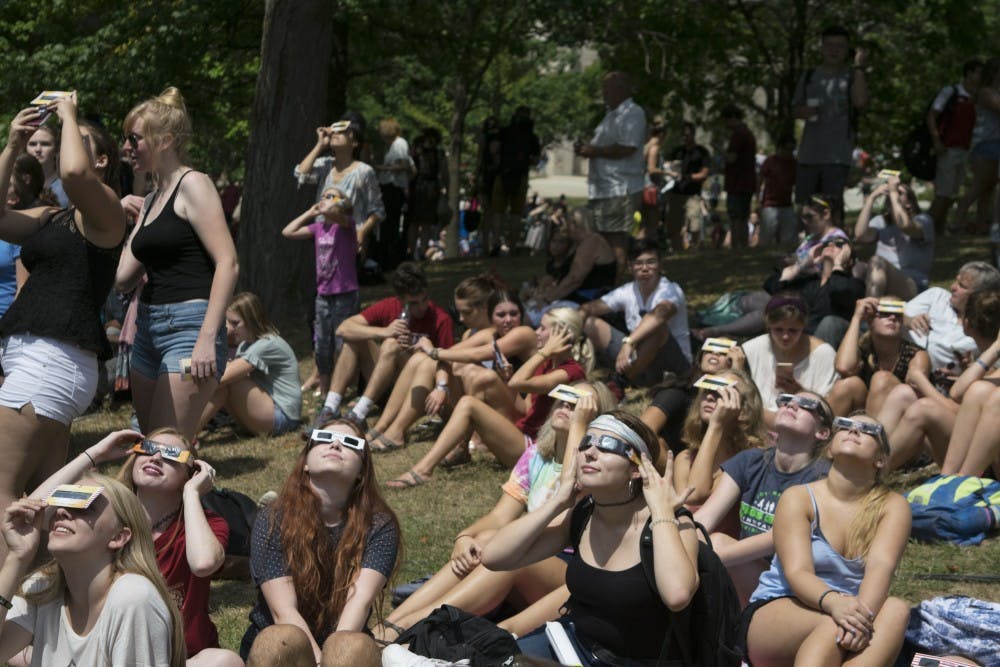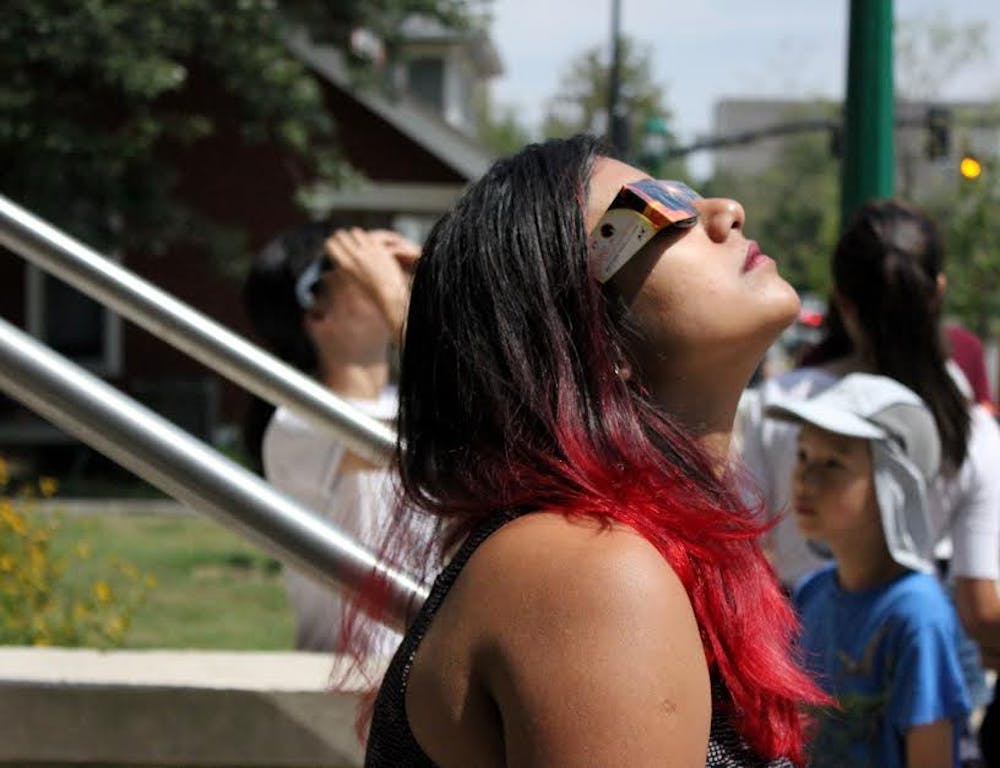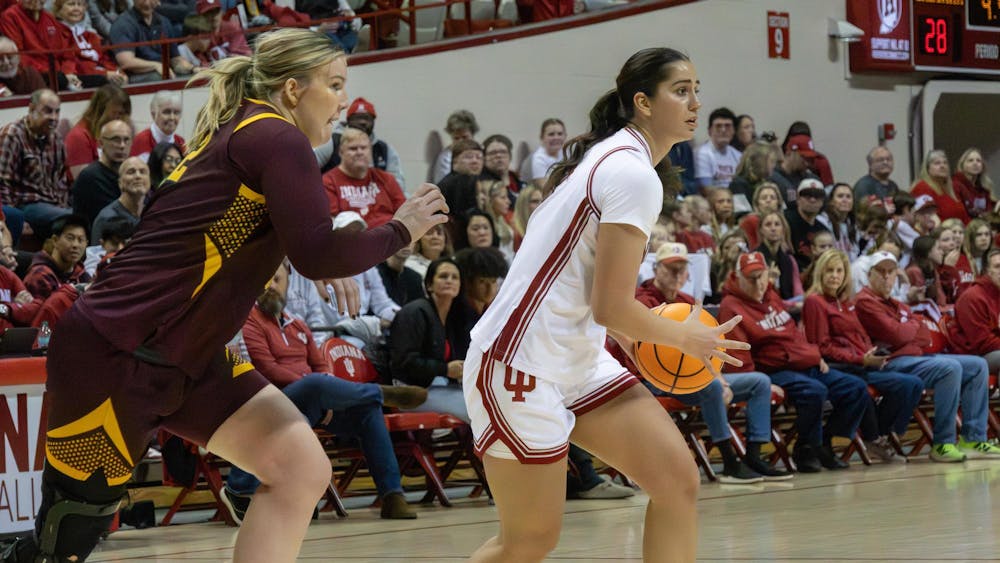Monday marked the first total solar eclipse spanning the United States since 1979. While many students headed to class, others wandered around campus and ventured around Monroe Lake, most wearing solar viewing glasses to watch as the sun and moon's paths collided.
***

When the people of ancient China experienced a solar eclipse in 1047 B.C., they had no science to explain why their world grew suddenly and ominously dark in the middle of the day.
“It was seen from early on as something extraordinary,” said Manling Luo, an associate professor of traditional Chinese literature and culture.
Around 15 students, faculty and staff gathered Monday afternoon in the Asian Culture Center to learn about solar eclipses in Chinese culture.
They were treated to shaded glasses, round cookies designed to resemble a half moon and speakers blaring “Total Eclipse of the Heart,” allowing them to experience the eclipse with feelings of safety and excitement that the ancient humans could not.
Luo explained to her audience how, back in the days of dynasties, emperors were thought to rule by the Mandate of Heaven, a divine right that allowed them to control their country. Whenever an eclipse shrouded the country, the blackened sky was seen as a bad omen for the current emperor. The eclipse in 1047 B.C. began a series of events that led to the Shang Dynasty's being overthrown about a year later.
The Chinese also thought solar eclipses happened because an animal was eating the sun, Luo said. People would bang on drums in hopes of scaring away the creature and saving the sun.
Outside, Luo’s 9-year-old son, Jiping Liu, stood next to his mother, speaking excitedly in Chinese and holding the too-big viewing glasses up to his face as he stared at the sky.
Although it didn’t get quite as dark as he would have liked, Jiping said he thought the eclipse was great.
“I haven’t seen anything like this myself,” Luo said. “It doesn’t happen that often.”
***
Boats sped around Monroe Lake 30 minutes before the eclipse’s peak. A curly-haired little boy wearing light blue boxers covered in cartoon characters ran out of the water onto the beach to look through his dad’s solar viewers.
“It looks like a cheese slice,” he said, just after ripping the glasses off and running back into the water.
People covered the swimming beaches, sitting on blankets and in chairs facing the lake. Sunlight reflected off the lenses of the glasses of a man and two women who were posing for a selfie in their solar viewers in front of the lake. A group of retirees posed for a picture in front of a bus that said Meadowood Retirement Community on the side.
At the time of the peak, all of the boats were still on the water. Many of the observers on the beach had their heads tilted up to the sun, and a girl wearing jean shorts and a black shirt with an illustration of an eclipse on it pointed toward the sun.
Audrey Jimenez, a Bloomington resident, sat on a concrete ledge close to the beach, watching her children swim. She didn’t have work, so she picked them up early from school to watch the eclipse. Jimenez held a pair of blue eclipse-viewing glasses covered in stars and suns.
She said the first time she looked, the moon was barely covering the sun, but she said she missed the peak because the change in the sky was so subtle.
“I noticed it started getting dark and thought I couldn’t miss it,” Jimenez said. By the time she looked again, the moon was passing over the other side of the sun.
By 2:30, viewers were already leaving the beach. A man in navy swimming trunks covered with white palm leaves told the woman he was with that it was “overhyped” as they packed up their belongings and left the beach.
***

With music playing in the background, sticky heat, long lines, people sprawled out on blankets and littered across grassy hills, CelestFest felt more like a mellowed-out music festival than a cosmic event.
“Woah! Oh my god, it’s already happening!” one man in the street said to no one in particular.
The climax was still an hour away, but the line to receive eclipse viewers already stretched from the amphitheater to the art museum on East Seventh Street. The line seemed to have formed on its own accord, snaking this way and that without much understandable order.
“I don’t know why I’m so tempted to just look up there,” a man without eclipse viewers said.
There was a general feeling of anticipation as the eclipse progressed. Some were simply excited to see such a rare event, while others were suspicious of its implications.
“I feel like something bad is going to happen, like a natural disaster,” Jenna Foster, an event attendee, said after the eclipse had passed.
As the eclipse drew nearer, the once-relaxing music grew more electronic and pulsating. It was as if the music were being beamed directly from the cosmos. A few groups of people waiting for the climax began to dance casually to the music.
The eclipse came and went without disaster, but some onlookers said they felt superstitious during the event.
“Everything felt like it got a little spookier,” Hannah Lewellyn, another attendee, said.
Suspicious or not, the eerie darkness and crescent-shaped shadows were possibly the most noted characteristics of the eclipse.
“It’s not very often I can pull out my phone, see that it’s 3 p.m. and have it be dark out,” Isaac Howe, a sophomore, said.
This story was compiled by Lydia Gerike, Peter Talbot and Kate McNeal






